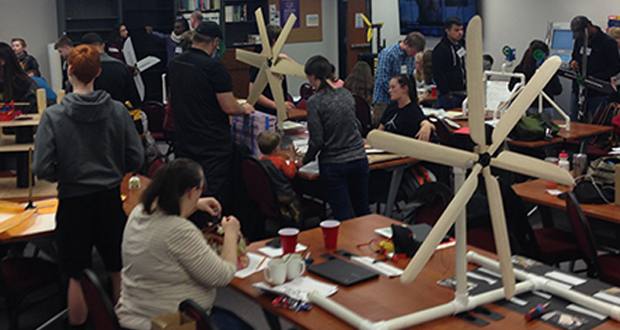Many Kansas students were happy when school was cancelled, but others were disappointed. Among the latter were the many students across the state that were involved in the Kansas KidWind Challenge.
Now, that program has been cancelled due to the COVID-19 pandemic.
“With schools being closed for the remainder of the school year, we decided it would be best to cancel the State KidWind Challenge for 2020,” said Ryan Hamel of the K-State Engineering Extension – Kansas Energy Program.
“One of the main reasons to host the State Challenge is to determine the winning teams that will move on to the National KidWind Challenge, which is held in early June,” Hamel said. “We have heard from those organizers it is highly unlikely the National KidWind Challenge will happen – many other states had their Challenges scheduled for March/April and will be unable to complete them.”
READ: Kansas small businesses eligible for disaster loans from the Small Business Administration
The science behind wind energy has captured the attention of Kansas students and boosted the number of competitors in the state’s KidWind Challenge from 17 teams in 2018 to 71 teams this year. The increased number of participants also prompted the addition of a fifth regional competition. After regional events, the Kansas KidWind Challege was scheduled to culminate in a state competition in Topeka on April 4 at the Topeka Center for Advanced Learning and Careers.
KidWind is an annual competition where student teams build and test their own wind turbines, then compete in a regional event for a chance to move on to state and national competitions. The events are part of the Energy Education partnership between the Kansas Corporation Commission and K-State Engineering Extension with a grant from the U.S. Department of Energy.
“KidWind is a fantastic hands-on opportunity that allows students to tinker and experiment with wind turbine designs. They experience the thrill of scientific discovery as their designs are validated through performance testing, and they hone their public-speaking skills as they present their turbine design to a panel of judges,” explained David Carter, Director of the Kansas Energy Program at K-State Engineering Extension.
Tatum Vogel, a teacher at Dighton Elementary, said the skills her students learned from KidWind extended beyond science to include perseverance and other life skills.
“We went to the regional competition with a turbine that was heavy and barely turned. We weren’t out of the city limits that day, and these students had already redesigned the entire top. The life skills involved were priceless. They had to communicate, work together, take initiative to learn more, and apply all the science and physics along the way,” said Vogel.
Teams compete by age group, 4th – 8th grades or 9th – 12th grades, with three to five students per team (recommended). At each regional competition, the top two teams in each age group advance to the state finals. State winners move on to the national competition in Denver. The complete schedule of events appears below. All events are open to the public.
More information about KidWind is available at https://kansasenergyprogram.org/kidwindchallenge.








